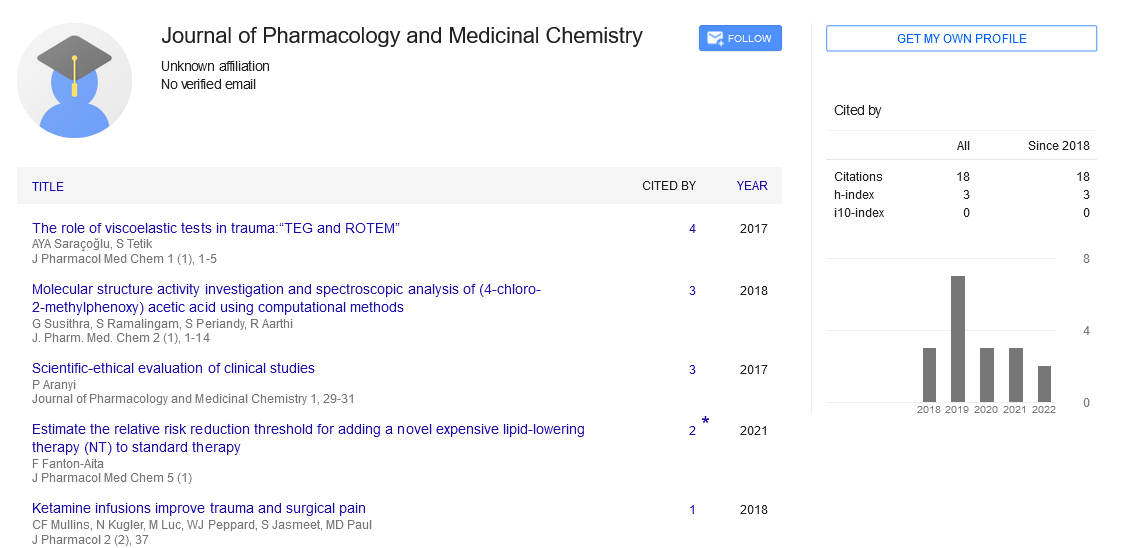Pharmacology biology and pharmaceutical sciences concerned with drug
Received: 01-Nov-2021 Accepted Date: Nov 16, 2021; Published: 23-Nov-2021
This open-access article is distributed under the terms of the Creative Commons Attribution Non-Commercial License (CC BY-NC) (http://creativecommons.org/licenses/by-nc/4.0/), which permits reuse, distribution and reproduction of the article, provided that the original work is properly cited and the reuse is restricted to noncommercial purposes. For commercial reuse, contact reprints@pulsus.com
Description
harmacology is a branch of medicine, biology and pharmaceutical sciences concerned with drug or medication action, where a drug may be defined as any artificial, natural, or endogenous (from within the body) molecule which exerts a biochemical or physiological effect on the cell, tissue, organ, or organism (sometimes the word pharmacon is used as a term to encompass these endogenous and exogenous bioactive species). More specifically, it is the study of the interactions that occur between a living organism and chemicals that affect normal or abnormal biochemical function. If substances have medicinal properties, they are considered pharmaceuticals. The field encompasses drug composition and properties, synthesis and drug design, molecular and cellular mechanisms, organ/systems mechanisms, signal transduction/cellular communication, molecular diagnostics interactions, chemical biology, therapy, and medical applications and anti- pathogenic capabilities. The two main areas of pharmacology are pharmacodynamics and pharmacokinetics. Pharmacodynamics studies the effects of a drug on biological systems, and pharmacokinetics studies the effects of biological systems on a drug. In broad terms, pharmacodynamics discusses the chemicals with biological receptors, and pharmacokinetics discusses the Absorption, Distribution, Metabolism, and Excretion (ADME) of chemicals from the biological systems.
Pharmacology is not synonymous with pharmacy and the two terms are frequently confused. Pharmacology, a biomedical science, deals with the research, discovery, and characterization of chemicals which show biological effects and the elucidation of cellular and organismal function in relation to these chemicals. In contrast, pharmacy, a health services profession, is concerned with the application of the principles learned from pharmacology in its clinical settings; whether it is in a dispensing or clinical care role. In either field, the primary contrast between the two is their distinctions between direct-patient care, pharmacy practice, and the science-oriented research field, driven by pharmacology. The origins of clinical pharmacology date back to the middle ages, with pharmacognosy and avicenna's the canon of medicine, peter of spain's commentary on isaac, and john of st amanda’s commentary on the antedotary of nicholas. Early pharmacology focused on herbalism and natural substances, mainly plant extracts. Medicines were compiled in books called pharmacopoeias. Crude drugs have been used since prehistory as a preparation of substances from natural sources. However, the active ingredient of crude drugs is not purified and the substance is adulterated with other substances.
Traditional medicine varies between cultures and may be specific to a particular culture, such as in traditional Chinese, Mongolian, Tibetan and Korean medicine. However much of this has since been regarded as pseudoscience. Pharmacological substances known as entheogens may have spiritual and religious use and historical context. In the 17th century, the English physician Nicholas Culpeper translated and used pharmacological texts. Culpeper detailed plants and the conditions they could treat.
In the 18th century, much of clinical pharmacology was established by the work of William Withering. Pharmacology as a scientific discipline did not further advance until the mid-19th century amid the great biomedical resurgence of that period. Before the second half of the nineteenth century, the remarkable potency and specificity of the actions of drugs such as morphine, quinine and digitalis were explained vaguely and with reference to extraordinary chemical powers and affinities to certain organs or tissues.
SYSTEMS OF THE BODY
Pharmacology can also focus on specific systems comprising the body. Divisions related to bodily systems study the effects of drugs in different systems of the body. These include neuropharmacology, in the central and peripheral nervous systems; immune pharmacology in the immune system. Other divisions include cardiovascular, renal and endocrine pharmacology. Psychopharmacology is the study of the use of drugs that affect the psyche, mind and behavior (e.g. antidepressants) in treating mental disorders (e.g. depression). It incorporates approaches and techniques from neuropharmacology, animal behavior and behavioral neuroscience, and is interested in the behavioral and neurobiological mechanisms of action of psychoactive drugs. The related field of neuron psycho pharmacology focuses on the effects of drugs at the overlap between the nervous system and the psyche.
CLINICAL PRACTICE AND DRUG DISCOVERY
Pharmacology can be applied within clinical sciences. Clinical pharmacology is the application of pharmacological methods and principles in the study of drugs in humans An example of this is posology, which is the study of how medicines are dosed. Pharmacology is closely related to toxicology. Both pharmacology and toxicology are scientific disciplines that focus on understanding the properties and actions of chemicals. However, pharmacology emphasizes the therapeutic effects of chemicals, usually drugs or compounds that could become drugs, whereas toxicology is the study of chemical's adverse effects and risk assessment pharmacological knowledge isused to advise pharmacotherapy in medicine and pharmacy. Drug discovery is the field of study concerned with creating new drugs. It encompasses the subfields of drug design and development. Drug discovery starts with drug design, which is the inventive process of finding new drugs. In the most basic sense, this involves the design of molecules that are complementary in shape and charge to a given bio molecular target. After a lead compound has been identified through drug discovery, drug development involves bringing the drug to the market. Drug discovery is related to pharmaco economics, which is the sub-discipline of health economics that considers the value of drugs pharmaco economics evaluates the cost and benefits of drugs in order to guide optimal healthcare resource allocation. The techniques used for the discovery, formulation, manufacturing and quality control of drugs discovery is studied by pharmaceutical engineering, a branch of engineering. Safety pharmacology specializes in detecting and investigating potential drugs





